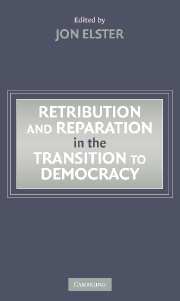Book contents
- Frontmatter
- Contents
- Contributors
- Preface and Acknowledgments
- 1 Introduction
- PART I GENERAL ISSUES
- PART II GERMANY AND GERMAN-OCCUPIED COUNTRIES AFTER 1945
- PART III LATIN AMERICA, POST COMMUNISM, AND SOUTH AFRICA
- 9 Paranoids May Be Persecuted: Post-totalitarian Transitional Justice
- 10 Transitional Justice in Argentina and Chile: A Never-Ending Story?
- 11 Transitional Justice in the German Democratic Republic and in Unified Germany
- 12 Rough Justice: Rectification in Post-authoritarian and Post-totalitarian Regimes
- 13 Truth and Reconciliation Commission in South Africa Amnesty: The Price of Peace
- 14 Conclusion
- Index
- References
14 - Conclusion
from PART III - LATIN AMERICA, POST COMMUNISM, AND SOUTH AFRICA
Published online by Cambridge University Press: 03 December 2009
- Frontmatter
- Contents
- Contributors
- Preface and Acknowledgments
- 1 Introduction
- PART I GENERAL ISSUES
- PART II GERMANY AND GERMAN-OCCUPIED COUNTRIES AFTER 1945
- PART III LATIN AMERICA, POST COMMUNISM, AND SOUTH AFRICA
- 9 Paranoids May Be Persecuted: Post-totalitarian Transitional Justice
- 10 Transitional Justice in Argentina and Chile: A Never-Ending Story?
- 11 Transitional Justice in the German Democratic Republic and in Unified Germany
- 12 Rough Justice: Rectification in Post-authoritarian and Post-totalitarian Regimes
- 13 Truth and Reconciliation Commission in South Africa Amnesty: The Price of Peace
- 14 Conclusion
- Index
- References
Summary
The contributors to Part II and Part III of this volume have surveyed some fifteen cases of transitional justice in new or restored democracies, clustered around 1945–50 and 1983–98. In this final chapter I shall go beyond these individual cases, to consider some broader issues.
LESSONS FROM THE PAST
Democratic transitional justice is almost as old as democracy itself. In 411 and then again in 403 b.c. the Athenian democrats had to come to terms with defeated oligarchic regimes (Ostwald 1986). In 411, they chose to proceed with considerable severity, without, however, departing from the rule of law. They did not, for instance, enact retroactive laws. In 403, the returning democrats proceeded more leniently, passing a general amnesty and allowing those exempt from it to go into exile. Part of the explanation for the leniency may be that the reconciliation agreement was written under the auspices of Sparta, which had helped the oligarchs to gain power. There are indicators, however, that in 403 the Athenians had learned from experience that severity might work against its purposes, angering its victims rather than deterring them.
I shall return shortly to the idea of learning from experience. First, however, I want to draw attention to a remarkable speech by Lysias, “Defense against a charge of subverting the democracy,” written shortly after the 403 amnesty for a (anonymous or hypothetical) candidate for public office. In this speech Lysias prefigures three important topoi of transitional justice in the twentieth century.
- Type
- Chapter
- Information
- Retribution and Reparation in the Transition to Democracy , pp. 317 - 328Publisher: Cambridge University PressPrint publication year: 2006



